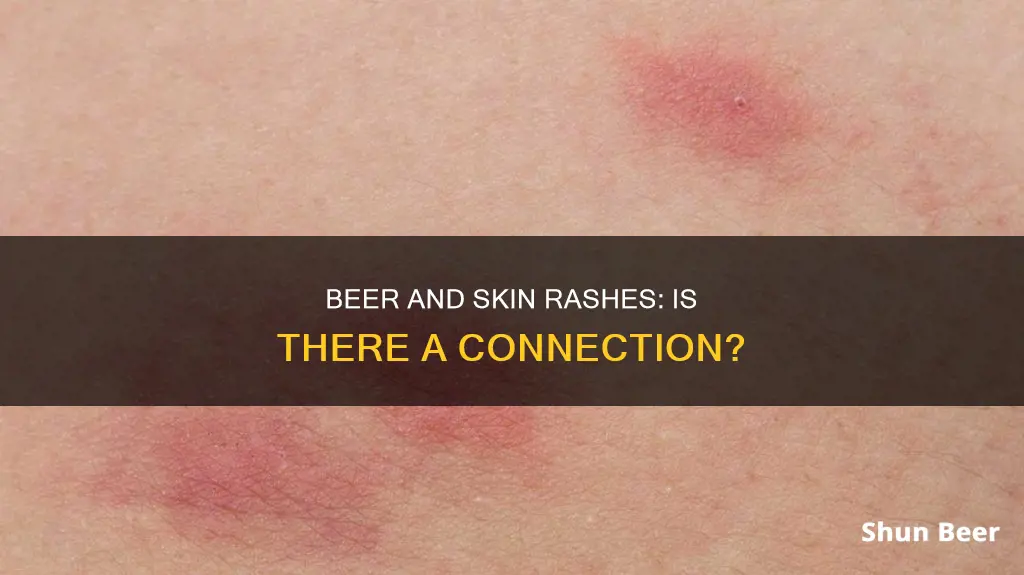
Drinking beer can cause a rash, but it is not a common reaction. Alcohol intolerance or an allergy to an ingredient in beer, such as wheat, is a more likely cause of a rash. Alcohol intolerance is caused by a genetic condition that prevents the body from breaking down alcohol efficiently. Allergic reactions to alcohol are rare, but they can be severe and life-threatening, requiring immediate medical attention.
| Characteristics | Values |
|---|---|
| Can drinking beer cause a rash? | Yes |
| Is it common? | No |
| Is it dangerous? | No, but in rare cases it can be life-threatening |
| What are the symptoms? | Rashes, flushing, redness, itching, hives, lip and tongue swelling, etc. |
| What causes it? | Genetic factors, drug interactions, underlying skin conditions, type of alcohol, alcohol allergy |
| How to prevent it? | Limit or avoid alcohol, especially beer |
| Treatment | Stop drinking alcohol, stay hydrated, use cool compresses and antihistamines |
What You'll Learn

Allergic reactions to beer
Although allergic reactions to alcohol are rare, they can occur. Allergic reactions to beer can be caused by the alcohol itself or other ingredients in the beer, such as wheat.
Symptoms of an Allergic Reaction
If you are allergic to beer, you may experience a range of symptoms, including:
- Skin rashes
- Redness and warmth of the skin, especially in the face (flushing)
- Itchy skin bumps (hives)
- Swelling of the lips and tongue
- Difficulty breathing
- Stomach cramps
- Anaphylaxis
Risk Factors
Risk factors for alcohol intolerance or allergic reactions to beer include:
- Being of East Asian descent
- Having asthma or hay fever
- Having an allergy to grains or other foods
Management
If you think you are allergic to beer, the best way to prevent a reaction is to avoid drinking beer or any other alcoholic beverages that contain the ingredient you are allergic to. You can also speak to a healthcare professional to determine the specific cause of your allergy and discuss treatment and prevention options. If you experience a severe allergic reaction, such as swelling of the face, tongue, or throat, seek immediate medical attention as this can be life-threatening.
Non-Alcoholic Beer: Safe for Liver Disease Patients?
You may want to see also

Flushing and redness
Causes
There are several reasons why drinking alcohol might lead to flushing and redness.
Genetic Factors
Alcohol-induced skin reactions can be caused by a genetic inability of the body to process alcohol properly. This is often the case for people with East Asian ancestry, who may experience extreme redness and warmth in the skin after consuming even small amounts of alcohol. This is due to an enzyme issue, where the enzyme ALDH2, which breaks down alcohol's toxic compound, does not work properly. As a result, the toxins stay in the cells, leading to warmth and flushing.
Alcohol Preparation and Consumption
The way alcohol is prepared and consumed can also contribute to skin reactions. Certain impurities, including preservatives, may be to blame. For example, the sulfites sometimes found in wine may trigger a reaction in some people. Additionally, the type of alcohol consumed can make a difference. Beer, for instance, is made with wheat, so individuals allergic to wheat may experience skin reactions after drinking beer.
Drug Interactions
Drinking alcohol with certain drugs, such as antibiotics, can cause uncomfortable skin reactions, especially flushing. One common antibiotic, metronidazole, is particularly associated with this reaction when combined with alcohol. This is known as a disulfiram-like reaction and often includes additional symptoms such as nausea, vomiting, headaches, and stomach pain.
Underlying Skin Conditions
Alcohol consumption can also trigger underlying skin conditions, such as rosacea, which is characterised by redness of the skin that often looks like blushing or flushing. While alcohol does not typically cause rosacea, it can trigger symptoms in those who have it. A 2017 study found that the risk of rosacea increased with increased alcohol intake in American women, although other studies have not found the same association.
Treatment
In most cases, alcohol-related skin reactions are not life-threatening and will subside once the alcohol is broken down and eliminated from the body. Stopping alcohol intake altogether or minimising the amount consumed is often the best way to prevent these reactions. However, in more severe cases, medical treatment may be required, especially if there is swelling of the face, tongue, or throat, as this can indicate a true alcohol allergy, which can be life-threatening.
Drinking Beer While Riding: Virginia's Law for Passengers
You may want to see also

Skin rashes and itching
Alcohol can cause skin reactions such as rashes, itching, redness, and flushing. These reactions are uncommon and are usually not dangerous. However, they can be bothersome and uncomfortable.
There are several reasons why alcohol may cause skin rashes and itching:
- Genetics: Alcohol intolerance, which is often genetic, can cause skin rashes and itching. This is more common in people with East Asian ancestry, who may experience extreme redness and warmth after consuming small amounts of alcohol.
- Drug interactions: Drinking alcohol with certain medications, such as antibiotics, can lead to drug interactions that result in skin rashes and itching. For example, metronidazole, a common antibiotic, is known to cause nausea, vomiting, headaches, and skin flushing when combined with alcohol.
- Pre-existing allergies: Alcohol can trigger allergic reactions in people with pre-existing allergies, such as wheat allergy, which may result in skin rashes and itching.
- Impurities in alcohol: Certain impurities, including preservatives such as sulfites, may contribute to skin rashes and itching. Some people may react to specific impurities and not others.
- Underlying skin conditions: Alcohol can trigger underlying skin conditions, such as rosacea, seborrheic dermatitis, and psoriasis, which can cause skin rashes and itching.
- Vitamin deficiencies: Alcohol abuse can lead to vitamin deficiencies, such as vitamin C deficiency, which in rare cases may cause skin rashes and itching.
If you experience skin rashes and itching after consuming alcohol, it is recommended to limit or avoid alcohol altogether to prevent further reactions. Consulting a healthcare professional can help determine the specific cause and provide guidance on treatment and prevention options.
The Ultimate Beer Snorkel Experience: How Does It Work?
You may want to see also

Alcohol intolerance
The symptoms of alcohol intolerance include facial redness (flushing), rapid heart rate, headache, low blood pressure, hives, runny nose, and stomach pain. These symptoms can occur regardless of the type of alcoholic beverage consumed, be it beer, wine, or hard liquor. Alcohol intolerance can also lead to major health problems, including an increased risk of cancers of the mouth, throat, oesophagus, stomach, and liver.
It is important to distinguish between alcohol intolerance and alcohol allergy. While alcohol intolerance is a digestive system disorder, an alcohol allergy is an immune system response to specific ingredients in alcoholic beverages, such as chemicals, grains, or preservatives. Allergic reactions to alcohol can cause symptoms similar to alcohol intolerance, such as difficulty breathing, coughing, a runny nose, or stomach upset. These symptoms can be triggered by even a small amount of alcohol and are the result of the body creating antibodies against allergens.
If you experience any of these symptoms after consuming alcohol and are unsure whether you have an alcohol allergy or intolerance, it is recommended to consult a doctor. To diagnose alcohol intolerance or allergy, a doctor may perform a skin test or a blood test to determine the specific substance causing the reaction.
The only way to prevent symptoms of alcohol intolerance or allergic reactions is to avoid alcohol or the particular beverage or ingredients that trigger the problem. For minor reactions, over-the-counter or prescription antihistamines may help reduce symptoms such as itching or hives. However, it is important to note that antihistamines do not reduce the susceptibility to critical risks associated with alcohol intolerance.
Gluten-Free Beer: Enjoy Drinking Without Worry
You may want to see also

Drug interactions
While true allergies to beer are rare, the many ingredients in beer make an allergy to one of its specific ingredients more likely. These ingredients include malt barley, brewer's yeast, hops, and assorted colorings, flavorings, and preservatives. If you are allergic to a specific grain, you will experience symptoms when consuming other food products containing that allergen.
If you feel ill after drinking beer, it is possible that you have an alcohol intolerance, which is a genetic condition caused by the body's inability to break down alcohol efficiently. Alcohol intolerance can cause immediate, uncomfortable reactions, such as a stuffy nose, facial redness, red itchy skin bumps, worsening of pre-existing asthma, and a runny nose.
Combining alcohol with certain medications can also cause reactions. For example, drinking alcohol while taking the antibiotic metronidazole can lead to a disulfiram-like reaction, resulting in nausea, vomiting, headaches, stomach pain, and skin flushing. It is important to speak with a doctor or pharmacist before consuming alcohol with any medication.
Beer and Glimepiride: Is It Safe to Drink?
You may want to see also
Frequently asked questions
Yes, drinking beer can cause a rash. Alcohol can lead to skin reactions such as rashes, redness, itching, and hives. These reactions can be caused by various factors, including drug interactions, underlying skin conditions, or an allergy to an ingredient in the alcohol.
Common symptoms associated with alcohol-induced rashes include flushing (redness and warmth of the skin, especially in the face), skin irritation and itchiness, and raised, red patches of skin known as hives.
Alcohol-induced rashes can be caused by several factors, including genetics, alcohol preparation and consumption methods, and pre-existing allergies. People with East Asian ancestry, for example, may experience extreme redness and warmth after consuming small amounts of alcohol due to a genetic inability to process alcohol efficiently.
The best way to prevent an alcohol-induced rash is to avoid alcohol or limit your consumption. If you suspect a particular type of alcohol or ingredient is triggering the rash, you can try avoiding it. Consulting a healthcare professional can also help determine the cause and provide guidance on treatment and prevention.







